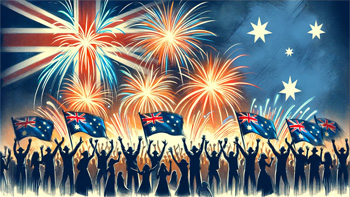 Australia Day
Australia Day


Australia Day, celebrated on January 26th, is one of the most significant national holidays in Australia. It marks the anniversary of the 1788 arrival of the First Fleet of British ships at Port Jackson, New South Wales, and the raising of the Flag of Great Britain at Sydney Cove by Governor Arthur Phillip. This day is more than just a public holiday; it's a day that holds historical significance and is a focal point for reflecting on the nation's heritage, diverse society, and achievements.
The celebration of Australia Day has evolved over time. Originally, it was a commemoration of British sovereignty over the eastern seaboard of Australia. However, as the nation developed and diversified, the meaning and observance of Australia Day have changed. Today, it is an occasion that unites all Australians, regardless of background, in a celebration of what it means to be Australian. From indigenous Australians, who have a history dating back tens of thousands of years, to the newest citizens, who have called Australia home more recently, January 26th is a day of community and togetherness.
Celebrations Across the Country
Australia Day is marked by community and family events, official community awards, and citizenship ceremonies welcoming new members into the Australian community. The day is celebrated throughout the country with outdoor concerts, sports competitions, festivals, and fireworks. Major cities host various events: Sydney has boat races including a ferry race and the tall ships race, while Melbourne often hosts cricket matches. In Adelaide, the day is celebrated with a parade, concert, fireworks, and an awards ceremony. Perth, too, hosts a large fireworks show.
One of the key aspects of Australia Day is the Australian of the Year Awards. These awards are presented to Australians who have made significant contributions to their communities or the nation. The awards are intended to reflect the diverse ways in which Australians contribute to society and highlight the achievements of individuals who often go unrecognized.
A Day of Controversy and Reflection
However, Australia Day is not without its controversies, especially regarding its significance to Indigenous Australians. For many Aboriginal and Torres Strait Islander people, January 26th is not a day of celebration but a day of mourning. This date represents the beginning of dispossession, displacement, and the ongoing marginalization of Indigenous Australians. As a result, the day is also marked by protests and calls for change. Some people refer to Australia Day as 'Invasion Day' or 'Survival Day', highlighting the resilience and survival of Indigenous cultures and peoples.
In recent years, there has been a growing movement to change the date of Australia Day to a day that is more inclusive and respectful of the country's Indigenous heritage. This debate has sparked nationwide discussions about Australian history, identity, and reconciliation. While no consensus has been reached, the conversation itself is an essential part of the evolving narrative of Australia Day.
Community Events and Activities
Community events are at the heart of Australia Day celebrations. These events often include outdoor barbecues, concerts, sports games, and community festivals. In smaller communities, local events are organized, which may include local sports tournaments, family picnics, and public performances. These gatherings are an opportunity for Australians to come together and celebrate the diverse and inclusive nature of their community.
Another popular aspect of Australia Day is the citizenship ceremony. For many people, this is the final step in their journey to becoming an Australian citizen. These ceremonies are a powerful and emotional experience, as they represent the diverse backgrounds of people who choose to make Australia their home. The ceremonies are often followed by community barbecues or public events, allowing new citizens to immediately engage in the spirit of Australia Day.
The Role of Food in Celebrations
No discussion of Australia Day would be complete without mentioning the food. As with many holidays in Australia, food plays a significant role in the day's celebrations. Barbecues are a popular choice, with Australians grilling sausages, chops, and steaks. Seafood is also a common feature, reflecting the country's strong connection to its surrounding oceans. Traditional Australian dishes, such as lamingtons and pavlova, are often served as part of the day's menu. These foods are not only delicious but also a way for Australians to express their national identity and culinary traditions.
Overall, Australia Day is a complex and multi-faceted holiday that encapsulates the history, diversity, and spirit of Australia. It's a day that brings people together in celebration while also providing an opportunity for reflection and discussion about the nation's past and future. As one of the key holidays in Australia, it continues to play a significant role in shaping the national identity and community spirit of Australians.